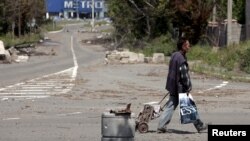Natalya Brazhnikova goes to sell bread each day at a badly charred market on the outskirts of Donetsk in east Ukraine despite the risk of shelling and gunfire.
Since her husband lost his job when the local coalmine closed because of fighting between government forces and pro-Russian separatists, their family has depended on the money she makes to survive.
Many other residents of the Oktyabrsky district on the northwestern edge of separatist-held Donetsk have fled. Those who remain face a struggle to survive even though a cease-fire was agreed in east Ukraine in February.
Brazhnikova, who is in her 40s, counts herself lucky that her stand near a bus stop was not destroyed when the market was hit by shelling and caught fire.
"Windows were shattered - here are the bullet holes... but it's good that they managed to put the fire out. It almost reached us here," she said from behind the counter.
"People have got used to shopping where the bus stops. It's convenient."
The journey on a Soviet-era bus brings passengers from central Donetsk to the market. Next to it lies the rubble of buildings hit by shells. Other buildings and roads are pock-marked by bullets or shells, and the bus stop has been damaged.
People in Donetsk, an industrial city of more than one million in peace time, are trying to make the most of the five-month-old cease-fire, a breathing space in a 15-month-old conflict that has killed more than 6,500 people.
But even when sitting in parks, going to the cinema, drinking coffee in cafes or strolling along the Kalmius River they are always mindful of where the nearest bomb shelter is in case they need to take cover.
There are daily casualties across east Ukraine and shells hit central Donetsk on Saturday for the first time since the truce was agreed. One civilian was killed.
Kyiv last Wednesday reported that eight government soldiers had been killed in the previous 24 hours, one of the highest tolls in months over such a short period.
‘Frozen conflict’
With Russia and the rebels accusing Ukraine's leaders of not implementing all the terms of the cease-fire agreement, and Kyiv and the West blaming the truce's fragility on Moscow and the rebels, it is an uneasy peace. Diplomacy involving France and Germany has failed to have much impact.
Steps yet to be fully implemented under the 13-point agreement reached in the Belarusian capital of Minsk include withdrawals of heavy weapons and moves to give the rebel-held eastern regions more autonomy.
President Vladimir Putin seems content, at least for now, to let the conflict remain “frozen” at a low level of fighting, despite Western economic sanctions imposed on Russia over its role in the crisis.
Although Moscow denies providing the rebels with troops or weapons, it has sufficient influence with the rebels to cause further problems for Kyiv's leaders and the West almost at will.
Backing down over the conflict would be politically risky for Putin, who has used it to whip up support in Russia. For the people of east Ukraine, months or years of uncertainty may lie ahead.
Living in deprivation
In Oktyabrsky, the shooting and shelling usually resumes a few hours before sunset and during the night.
"We've already got used to the machineguns. We're not afraid of them. They shoot and that's okay. But when this starts...," said former choreographer Yelena Degtyarenko, pointing at a crater at her backyard, hit by a shell last week.
The 44-year-old woman burst into tears as she described hiding from artillery fire in the cellar with her husband, two dogs and two kittens.
"No one knows when this will end," said her 62-year-old neighbour Galina Kryukova, showing the charred remains of her home.
"I'm homeless now. What did I live for? What did I work for? We spent six years building it and managed to live in it for just five."
The only resident of three nine-story apartment buildings built for miners several decades ago is a 75-year-old man called Mikhail. Some of the windows have no glass panes, some of the walls are scorched and pockmarked by holes, and the water, electricity and gas were cut off several months ago when the buildings were caught in the crossfire.
Mikhail, who declined to give his full name, said some of his neighbors return in the mornings to check whether their apartments are still standing and then quickly go away.
"Our house has already died. No one would stay here for the winter. Everything has been smashed. The boiler doesn't work. As long as they are shooting, the electricians won't come here to fix the electricity," he said.





